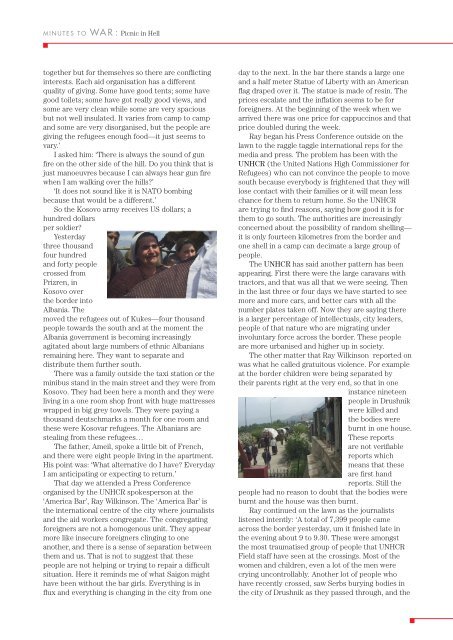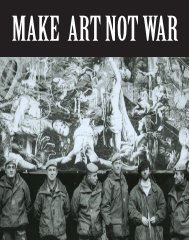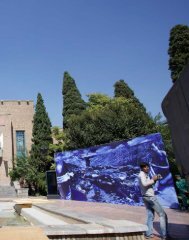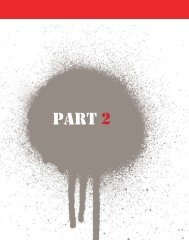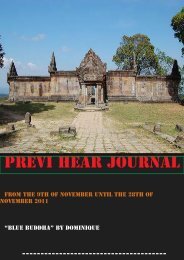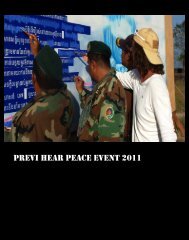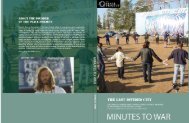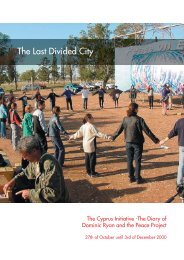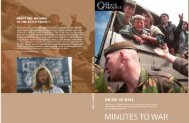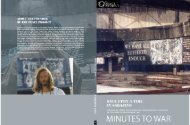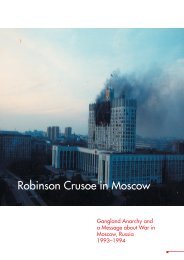You also want an ePaper? Increase the reach of your titles
YUMPU automatically turns print PDFs into web optimized ePapers that Google loves.
M I N U T E S T O WA R : Picnic in Hell<br />
together but for themselves so there are conflicting<br />
interests. Each aid organisation has a different<br />
quality of giving. Some have good tents; some have<br />
good toilets; some have got really good views, and<br />
some are very clean while some are very spacious<br />
but not well insulated. It varies from camp to camp<br />
and some are very disorganised, but the people are<br />
giving the refugees enough food—it just seems to<br />
vary.’<br />
I asked him: ‘There is always the sound of gun<br />
fire on the other side of the hill. Do you think that is<br />
just manoeuvres because I can always hear gun fire<br />
when I am walking over the hills?’<br />
‘It does not sound like it is NATO bombing<br />
because that would be a different.’<br />
So the Kosovo army receives US dollars; a<br />
hundred dollars<br />
per soldier?<br />
Yesterday<br />
three thousand<br />
four hundred<br />
and forty people<br />
crossed from<br />
Prizren, in<br />
Kosovo over<br />
the border into<br />
Albania. The<br />
moved the refugees out of Kukes—four thousand<br />
people towards the south and at the moment the<br />
Albania government is becoming increasingly<br />
agitated about large numbers of ethnic Albanians<br />
remaining here. They want to separate and<br />
distribute them further south.<br />
There was a family outside the taxi station or the<br />
minibus stand in the main street and they were from<br />
Kosovo. They had been here a month and they were<br />
living in a one room shop front with huge mattresses<br />
wrapped in big grey towels. They were paying a<br />
thousand deutschmarks a month for one room and<br />
these were Kosovar refugees. The Albanians are<br />
stealing from these refugees…<br />
The father, Ameil, spoke a little bit of French,<br />
and there were eight people living in the apartment.<br />
His point was: ‘What alternative do I have? Everyday<br />
I am anticipating or expecting to return.’<br />
That day we attended a Press Conference<br />
organised by the UNHCR spokesperson at the<br />
‘America Bar’, Ray Wilkinson. The ‘America Bar’ is<br />
the international centre of the city where journalists<br />
and the aid workers congregate. The congregating<br />
foreigners are not a homogenous unit. They appear<br />
more like insecure foreigners clinging to one<br />
another, and there is a sense of separation between<br />
them and us. That is not to suggest that these<br />
people are not helping or trying to repair a difficult<br />
situation. Here it reminds me of what Saigon might<br />
have been without the bar girls. Everything is in<br />
flux and everything is changing in the city from one<br />
day to the next. In the bar there stands a large one<br />
and a half meter Statue of Liberty with an American<br />
flag draped over it. The statue is made of resin. The<br />
prices escalate and the inflation seems to be for<br />
foreigners. At the beginning of the week when we<br />
arrived there was one price for cappuccinos and that<br />
price doubled during the week.<br />
Ray began his Press Conference outside on the<br />
lawn to the raggle taggle international reps for the<br />
media and press. The problem has been with the<br />
UNHCR (the United Nations High Commissioner for<br />
Refugees) who can not convince the people to move<br />
south because everybody is frightened that they will<br />
lose contact with their families or it will mean less<br />
chance for them to return home. So the UNHCR<br />
are trying to find reasons, saying how good it is for<br />
them to go south. The authorities are increasingly<br />
concerned about the possibility of random shelling—<br />
it is only fourteen kilometres from the border and<br />
one shell in a camp can decimate a large group of<br />
people.<br />
The UNHCR has said another pattern has been<br />
appearing. First there were the large caravans with<br />
tractors, and that was all that we were seeing. Then<br />
in the last three or four days we have started to see<br />
more and more cars, and better cars with all the<br />
number plates taken off. Now they are saying there<br />
is a larger percentage of intellectuals, city leaders,<br />
people of that nature who are migrating under<br />
involuntary force across the border. These people<br />
are more urbanised and higher up in society.<br />
The other matter that Ray Wilkinson reported on<br />
was what he called gratuitous violence. For example<br />
at the border children were being separated by<br />
their parents right at the very end, so that in one<br />
instance nineteen<br />
people in Drushnik<br />
were killed and<br />
the bodies were<br />
burnt in one house.<br />
These reports<br />
are not verifiable<br />
reports which<br />
means that these<br />
are first hand<br />
reports. Still the<br />
people had no reason to doubt that the bodies were<br />
burnt and the house was then burnt.<br />
Ray continued on the lawn as the journalists<br />
listened intently: ‘A total of 7,399 people came<br />
across the border yesterday, um it finished late in<br />
the evening about 9 to 9.30. These were amongst<br />
the most traumatised group of people that UNHCR<br />
Field staff have seen at the crossings. Most of the<br />
women and children, even a lot of the men were<br />
crying uncontrollably. Another lot of people who<br />
have recently crossed, saw Serbs burying bodies in<br />
the city of Drushnik as they passed through, and the


